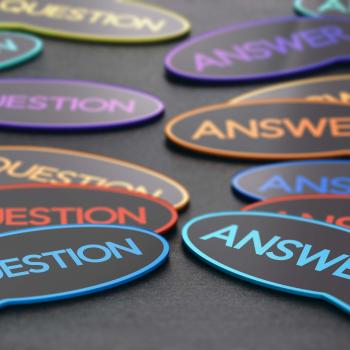Students' responses to this lesson will be out of this world after they've researched astronomy to write poetry and compile a poetry book.

Astronomy Poetry: Combining Poetry With the Content Areas

Grades
|
Vote for Me! Developing, Writing, and Evaluating Persuasive Speeches
4 - 5
Lesson Plan
| Standard Lesson
This lesson encourages students in grades 4 and 5 to think critically and write persuasively by focusing on preparing, presenting, and evaluating mock campaign speeches.

Grades
|
Using Science Texts to Teach the Organizational Features of Nonfiction
3 - 5
Lesson Plan
| Standard Lesson
Students explore organizational features of nonfiction science. Students then work together to create a two-page spread using those features to present information about their local environment.

Grades
|
Q is for Duck: Using Alphabet Books With Struggling Writers
3 - 5
Lesson Plan
| Standard Lesson
A is for zoo? Q is for duck? The alphabet as students know it is transformed when students create a class book that contains clever associations for each letter of the alphabet.

Grades
|
Questioning: A Comprehension Strategy for Small-Group Guided Reading
3 - 5
Lesson Plan
| Standard Lesson
Students learn about the process of questioning and using webs to organize information during reading and then practice writing factual and inferential questions.

Grades
|
Thrills! Chills! Using Scary Stories to Motivate Students to Read
6 - 8
Lesson Plan
| Unit
Students examine story elements through teacher read-alouds and independent reading and then use reader-response journals and graphic organizers to prepare for the creation of their own scary stories.

Grades
|
Reciprocal Revision: Making Peer Feedback Meaningful
6 - 8
Lesson Plan
| Standard Lesson
Interpreting art is a subjective process. In this lesson, students write written responses analyzing a work of art and use feedback from their peers to revise or confirm their initial responses.
Grades
|
Junie B. Jones Introduces Literacy Mystery Boxes
K - 2
Lesson Plan
| Unit
Like Junie B. Jones, students will be saying "Wait till you hear this" after listening to a Junie B. story and creating mystery boxes to help retell the story.

Grades
|
You Can't Spell the Word Prefix Without a Prefix
6 - 8
Lesson Plan
| Standard Lesson
Students explore the role of prefixes, as well as their origins and meanings, and examine how the understanding of prefixes can improve comprehension, decoding, and spelling.

Grades
|
A Biography Study: Using Role-Play to Explore Authors' Lives
9 - 12
Lesson Plan
| Standard Lesson
Students read biographies and explore websites of selected American authors and then role-play as the authors.

Grades
|
Behind the Masks: Exploring Culture Through Art and Poetry
9 - 12
Lesson Plan
| Unit
Students research mask-making from various cultures, highlight the masks' connections to cultural practices, compose poetry to reveal their understanding, analyze their own culture, and create personal masks and poetry.

Grades
|
A High-Interest Novel Helps Struggling Readers Confront Bullying in Schools
9 - 12
Lesson Plan
| Unit
Students read a work of realistic fiction about bullying and gain understanding through writing, Readers Theatre, and discussion.

Grades
|
A Bad Case of Bullying: Using Literature Response Groups
3 - 5
Lesson Plan
| Standard Lesson
Students learn how to effectively deal with bullying by participating in literature response groups and writing about when they experienced a similar situation or emotion as a fictional character.

Grades
|
Applying Question-Answer Relationships to Pictures
3 - 5
Lesson Plan
| Standard Lesson
A picture is worth a thousand words as students are guided in viewing wordless picture books and responding to four different types of questions about the images they see.

Grades
|
Using Personal Connections to Build an Understanding of Emotions
K - 2
Lesson Plan
| Standard Lesson
What makes you happy? What makes you sad? Connecting words to feelings enriches vocabulary and helps with concept development.

Grades
|
Thundering Tall Tales: Using Read-Aloud as a Springboard to Writing
3 - 5
Lesson Plan
| Standard Lesson
Imagination and application are key to this tall tale lesson in which students take what they know about tall tales to spin a yarn of their own.

Grades
|
Developing Students' Critical Thinking Skills Through Whole-Class Dialogue
3 - 5
Lesson Plan
| Standard Lesson
"That's my position and I'm sticking to it!" After reading about the Korean War, students will take a position in response to an open-ended question, support their position, and evaluate that support.

Grades
|
Pourquoi Stories: Creating Tales to Tell Why
3 - 5
Lesson Plan
| Standard Lesson
Where did the stars come from? What makes lightning and thunder? Pourquoi tales are narratives developed by various cultures around the world to explain natural phenomena. Students study three tales and learn about their cultures of origin, then work cooperatively to write and present an original pourquoi tale.

Grades
|
Timelines and Texts: Motivating Students to Read Nonfiction
6 - 8
Lesson Plan
| Standard Lesson
In an effort to help motivate students to read nonfiction, students are challenged to use a timeline to help them name the year when certain products were invented.

Grades
|
Artistic Elements: Exploring Art Through Descriptive Writing
3 - 5
Lesson Plan
| Standard Lesson
Paint a vivid picture in your reader's mind with good descriptive writing! Artwork provides the perfect starting point for practicing descriptive writing that conveys color, shape, line, and mood.